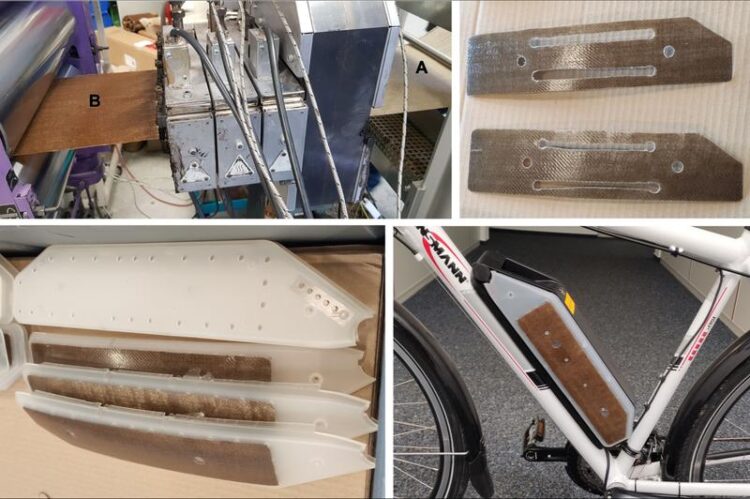Lightweight construction with natural fibre-reinforced plastics used for Li-ion battery housings

Thin organic sheets (B) are made from flax fabrics (A) and polypropylene to reinforce the housing panels of an e-bike battery.
© Ansmann AG & Fraunhofer LBF
To respond individual customer requirements and to meet social and political responsibility, a research project was carried out in cooperation between Ansmann AG and Fraunhofer Institute für Structural Durability and System Reliability LBF. Aim was the development of natural fibre-reinforced plastics for usage in Li-ion battery housings.
Fraunhofer Researchers will present more details at the Fraunhofer booth, Hall 7, SC01, at the “K-Messe” in Düsseldorf from October 19 to 26.
Current trends demonstrate the growing importance of sustainable products and production processes. Drivers here are not only emission regulations, but also the growing awareness of the environment and sustainability in society.
Therefore, more sustainable solutions are needed to transform the product as well as the value chain and product development.
Sustainable lightweight construction means innovative future technology. Researchers at the Fraunhofer LBF are deliberately pushing the limits of what is feasible. This results in property-optimized, lightweight structural solutions – always considering the reliability, sustainability, and affordability of the technical product solution.
Lightweight construction with natural fibre-reinforced plastics used for Li-ion battery housings
To respond individual customer requirements and to meet social and political responsibility, a research project was carried out in cooperation between Ansmann AG and the Fraunhofer LBF. Aim was the development of natural fibre-reinforced plastics for usage in Li-ion battery housings.
Due to their low density, good mechanical properties, low tendency to splinter and the comparatively low costs, while at the same time increasing sustainability, such natural fibre reinforced plastics were convincing as an alternative to glass or carbon fibre reinforcement.
Process to produce NFRP organic sheets with reduced thermal stress on the natural fibers
At the Fraunhofer LBF, a new process was developed to impregnate different natural fibre fabrics with plastic melt at reduced contact times and modify them according to requirements. Based on an adapted component design of the battery housing, to meet the numerous standards, local natural fibre reinforcements were integrated into the housing using an innovative injection moulding process.
Compared to the standard housing, the NFRP-Housing impresses with a weight reduction of 30 percent and a simultaneous increase in rigidity of 15 percent, while at the same time addressing the principle of efficient and environmentally friendly use of resources
Wissenschaftliche Ansprechpartner:
Shilpa Khare, shilpa.khare@lbf.fraunhofer.de
Dr. Christian Beinert, christian.beinert@lbf.fraunhofer.de
Weitere Informationen:
http://www.lbf.fraunhofer.de/en/projects/lightweight-biobased-plastics.html More information to the project
Media Contact
All latest news from the category: Machine Engineering
Machine engineering is one of Germany’s key industries. The importance of this segment has led to the creation of new university degree programs in fields such as production and logistics, process engineering, vehicle/automotive engineering, production engineering and aerospace engineering among others.
innovations-report offers informative reports and articles covering technologies such as automation, motion, power train, energy, conveyor, plastics, lightweight construction, logistics/warehousing, measurement systems, machine tools and control engineering.
Newest articles

Innovative 3D printed scaffolds offer new hope for bone healing
Researchers at the Institute for Bioengineering of Catalonia have developed novel 3D printed PLA-CaP scaffolds that promote blood vessel formation, ensuring better healing and regeneration of bone tissue. Bone is…

The surprising role of gut infection in Alzheimer’s disease
ASU- and Banner Alzheimer’s Institute-led study implicates link between a common virus and the disease, which travels from the gut to the brain and may be a target for antiviral…

Molecular gardening: New enzymes discovered for protein modification pruning
How deubiquitinases USP53 and USP54 cleave long polyubiquitin chains and how the former is linked to liver disease in children. Deubiquitinases (DUBs) are enzymes used by cells to trim protein…



